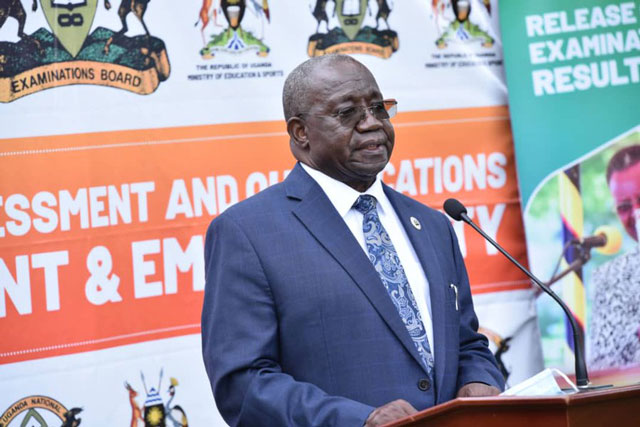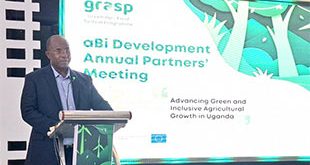
Kampala, Uganda | THE INDEPENDENT | Students are struggling to pass science subjects. According to the 2022 UCE results released on Thursday, there was a general improvement in the performance of physics, chemistry, and mathematics but overall, students are still struggling to pass the four compulsory science subjects.
“There is an improvement in performance in the large entry subjects except in Christian Religious Education, Biology, and Commerce. Mathematics showed better performance at the Distinction level but declined overall. Worth noting is that performance in Physics and Chemistry has improved, although the overall pass levels are still low. Over 40% of the candidates have not passed the two subjects,” Dan Odongo, the Executive Secretary of UNEB said.
In Biology, only 0.2 percent out of 349,459 candidates were able to get a distinction compared to 0.7 percent in 2020. Odongo attributed this performance to the over-concentration of the theoretical component of the subjects to the detriment of the practical components.
“In Sciences, the problems have remained the same as in recent years. Candidates showed weaknesses in the handling of apparatus during the practical tests. The weaknesses were also shown in making and recording observations and drawing conclusions from those observations, tabulation of experimental results and interpretation of the results to meet the demands of the question,” Odongo said.
He added; “They also showed poor mathematical skills required in calculations, inability to write the correct symbols of elements, formulae of compounds and equations, among others. Many candidates take measurements and tabulate the readings and stop on that, being unable to do anything else with the tabulated data,”
According to Odongo, “a lot of candidates showed a lack of practical experience in handling the apparatus as many schools tend to handle practical aspects of the curriculum much later in the course. As a result, students do not develop the necessary skills. This could explain why most malpractice cases are in Science practical papers,” Odongo said.
Prof. Mary Okwakol, the UNEB Chairperson said although the government has invested heavily in the teaching of sciences, these investments are yet to bear fruits.
“The board applauds the efforts by the government to improve performance in sciences…our hope is that these interventions translate into better performance by candidates,” Okwakol said.
The Minister of Education and Sports, Janet Kataha Museveni said her government will continue with the efforts that will see improvement in the performance of science subjects. “This matter is currently being addressed through the intervention of curriculum reviews. These reviews aim at among other things doing away with obsolete information, reducing subject content overload and contact hours in the classroom, so as to create time for research, talent development, and creativity among other things. This we hope will help improve the learners’ performance.
She added, “the ministry notes that this year the overall performance in the acience subjects that are compulsory is not yet satisfactory although there is some improvement.”
The government is committed to promoting the teaching and learning of science subjects as you know.
Aaron Mugaiga, the Secretary General of the Uganda Professional Science Teachers Union, says the government’s decision to raise science teacher wages will eventually lead to improving students’ performance in science disciplines because teachers are now giving more time to students than before.
Asked why students are constantly cramming for practical exams, Mugaiga blamed the problem on a lack of practical equipment in some schools. He said that the prior curriculum was more theoretical, but with the new curriculum, which is more practical, students will spend more time participating in practical exercises.
Suleiman Chemisto, a physics and mathematics teacher at City High School, attributes the improvement to the fact that many schools began introducing practical lessons to students as early as senior three, as well as the use of practical manual books, which many schools embraced after realizing that students were concentrating on the theory.
Chemisto however noted that students have consistently failed to read and conduct independent research, both of which are essential for excelling in these courses.
The head teacher for Namakwa Senior Secondary School in Nakisunga Sub County Mukono District, Robert Mayemba says the majority of government schools lack equipment for practicals.
He also notes that some teachers have a poor attitude toward teaching practicals.
Dan Maguzi, a science teacher at Namakwa says government schools are always overwhelmed by a big number of students yet they need adequate time to internalize concepts given to them.
Mukono District had 15,494 candidates who sat for the examinations, 4,227 were in first grade, 3,925 in second, and 3,493 in third grade. 3,392 passed in fourth grade and 400 were ungraded.
*****
URN
 The Independent Uganda: You get the Truth we Pay the Price
The Independent Uganda: You get the Truth we Pay the Price




About 50 years ago; there was something called School Science Project( SSP)
There were practical Manuals : SSP-Chemistry, SSP-Physics and SSP-Biology
The Practical sessions did run from seniour one to Seniour four
( However the coverage of the entire manual did not occur!)
For the sessions all the material required was present
Students worked in pairs
Supervised by experienced technicians and teachers
At HSC, the products of SSP struggled to draw what they were observing under the microscope. But they realised that students from another system could draw and label part of a leaf or part of a fish without spending much time at the microscope (!)
Òne suspects that each system has advantages and disadvantages
Let the environment be conducive for teaching science in all schools